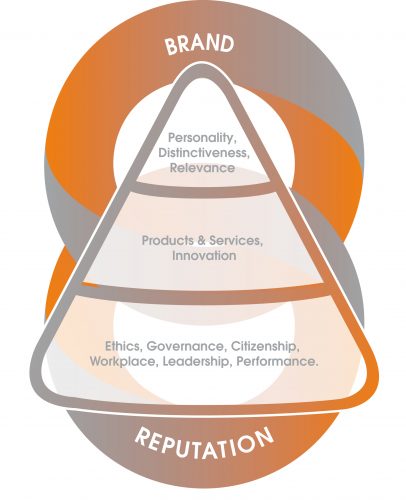
Could Nicola Sturgeon’s fate prove that you win on brand but lose on reputation?
We have been musing here at Tovera at the apparent fact that corporates, businesses, brands, even politicians seem to win on brand but lose on reputation. Normally we resist quite such binary statements and much prefer nuance, since that’s usually more reflective of untidy reality. But we can’t help but observe in the torrid time that’s being experienced at the top of the Scottish government, how this seems to be playing out.
We can apply our holistic model of brand, product and reputation to political party leaders as well as to corporate entities. When we asked the general public to assess the attributes of the four main UK party leaders plus Nicola Sturgeon as if they were corporate brands, our findings confirmed the model and the adage quoted above. In the study, carried out before the last general election, we looked at the influence of voter perceived personal brand attributes such as personality, relevance and vision alongside reputation attributes such as track record of achievement, honesty and ethics.
Our respondents were more likely to be influenced by forward looking brand and product attributes (such as relevance, being considered ‘for me’, having a clear vision and strategy) than by rear-view mirror reputation attributes (such as their track record of achievement, and whether they were considered as honest or ethical). Boris Johnson achieved the highest scores across brand attributes which reflected in his eventual win.
The then labour leader, Jeremy Corbyn, scored better on reputation attributes such as honesty and, amongst his own voters, on ethics, where Boris Johnson achieved his lowest scores. And of course Jeremy Corbyn went on to lose. It reveals that voters were motivated more by forward looking brand attributes and a clear vision for the future than they were by perhaps more worthy attributes such as honesty and ethics. Boris Johnson was seemingly forgiven (then) for a perceived lack of honesty and ethics as he convinced enough people of his positive vision.
What is striking now is that Nicola Sturgeon was the closest any of the party leaders came to having a balanced holistic image of good brand, good product and sound reputation. So it is instructive to see what is happening as the reputational elements of the Nicola Sturgeon brand are being chipped away at. Her vision, strategy, personality arguably all remain intact, but the reputational bedrock of honesty, integrity and good governance is under great strain and could prove the brand’s undoing.
Only time will tell, but whilst brand Sturgeon continues to fly high, it would appear that it’s her reputation that’s in crisis and likely to lead to her demise.
Either way, it proves again that politicians, like corporates, need both a strong brand and and strong reputation to succeed over the long term.
…
Request the results of our political research here.
See more of our thoughts on brand and reputation and related subjects, here.

